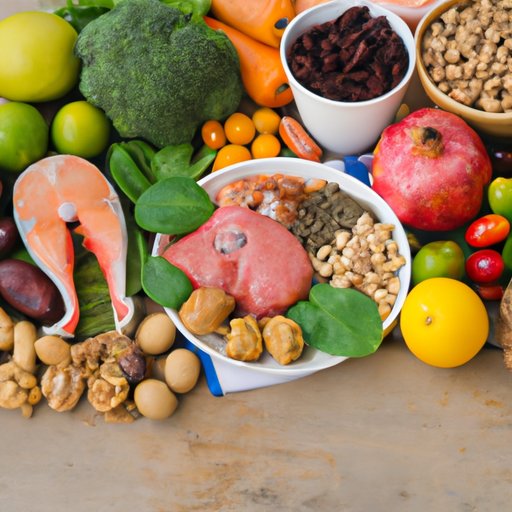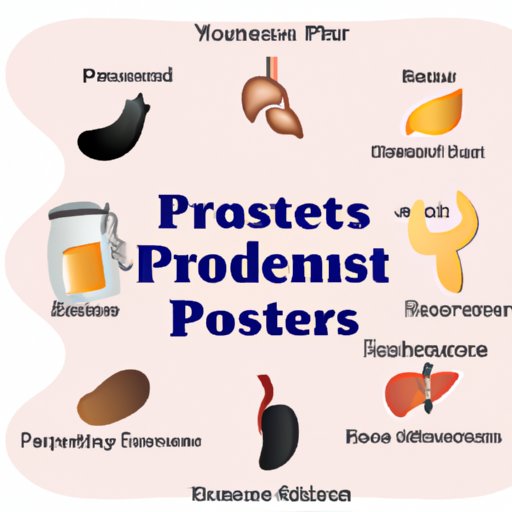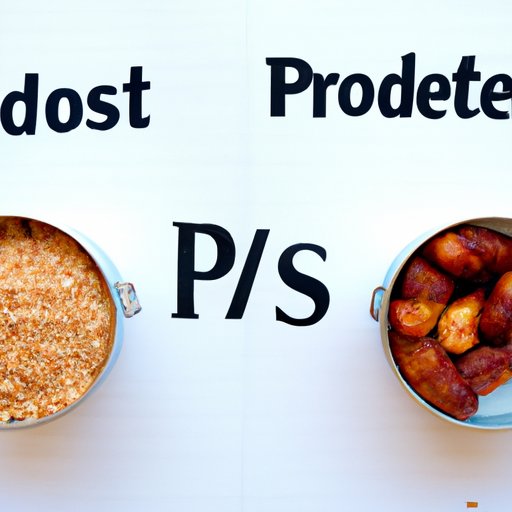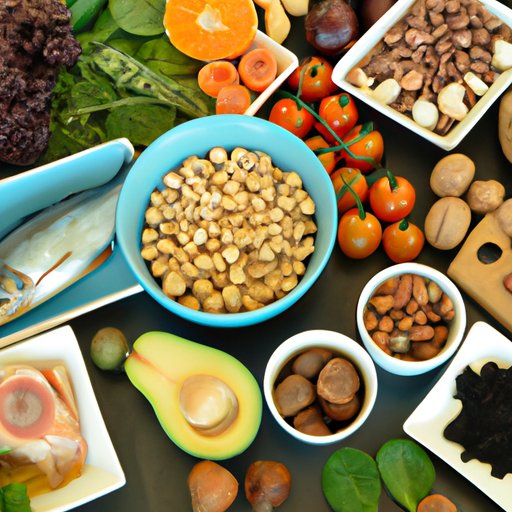Introduction
Prostate health is an important topic for men’s health. While there are many factors that can influence prostate health, nutrition plays a key role. Eating the right foods can help protect against prostate disease, while eating unhealthy foods can increase risk. In this article, we’ll explore what foods to eat for prostate health, as well as the benefits of specific foods, tips for incorporating them into your diet, and an overview of the latest research.

Review of the Best Foods for Prostate Health
When it comes to prostate health, the best approach is to eat a balanced diet that is rich in nutrient-dense foods. This means focusing on plant-based foods like fruits and vegetables, whole grains, nuts, seeds, and legumes, as well as healthy fats. Here’s a closer look at each category:
Fruits and Vegetables
Fruits and vegetables are packed with vitamins, minerals, and other beneficial compounds. They are also low in calories and high in fiber, which makes them filling and satisfying. Aim to get at least five servings of fruits and vegetables per day.
Whole Grains
Whole grains are an excellent source of complex carbohydrates and provide essential vitamins and minerals. Choose whole grain breads and pastas, brown rice, and oats. Limit refined grains like white bread and white pasta.
Nuts, Seeds, and Legumes
Nuts, seeds, and legumes contain protein, fiber, and healthy fats. They also provide vitamins and minerals. Try to include a variety of these foods in your diet, such as almonds, walnuts, pistachios, sunflower seeds, flaxseeds, chickpeas, lentils, and black beans.
Healthy Fats
Healthy fats are important for prostate health. Good sources include olive oil, avocados, and fatty fish like salmon and tuna. Avoid unhealthy fats like trans fats and saturated fats, which are found in processed and fried foods.

Exploring the Benefits of Specific Foods for Prostate Health
In addition to eating a balanced diet, there are certain foods that have been linked to improved prostate health. Here’s a closer look at the benefits of some of the most popular prostate-supporting foods:
Cruciferous Vegetables
Cruciferous vegetables, such as broccoli, cauliflower, and Brussels sprouts, are rich in antioxidants and anti-inflammatory compounds. Studies show that these compounds may help protect against prostate cancer. They may also reduce inflammation in the prostate, which can improve prostate health.
Tomato Products
Tomatoes are rich in the antioxidant lycopene, which has been linked to reduced risk of prostate cancer. Tomatoes are also a good source of vitamin C and other nutrients. Eating tomato-based products like tomato sauce or tomato soup may be beneficial for prostate health.
Fatty Fish
Fatty fish like salmon, tuna, and mackerel are rich in omega-3 fatty acids, which have anti-inflammatory properties. Studies suggest that consuming fatty fish regularly may reduce the risk of prostate cancer. Fatty fish are also an excellent source of protein and other vitamins and minerals.
Soy Foods
Soy foods, such as edamame, tofu, and tempeh, are rich in isoflavones, which are plant compounds with potential cancer-fighting properties. Studies suggest that consuming soy foods regularly may reduce the risk of prostate cancer. Soy foods are also a great source of protein and other nutrients.
Tips for Incorporating Prostate Supporting Foods into Your Diet
The best way to ensure you’re getting all the nutrients you need for prostate health is to eat a variety of different foods. Here are some tips for incorporating prostate-supporting foods into your diet:
Balance Your Meals
Aim to make every meal balanced by including a source of protein, healthy fat, complex carbohydrates, and fiber. This will help you feel full and satisfied, while providing your body with the nutrients it needs.
Increase Variety
Try to include a variety of different foods in your diet. This helps ensure you’re getting all the vitamins, minerals, and other beneficial compounds you need for prostate health.
Watch Portion Sizes
It’s important to watch portion sizes, especially when it comes to unhealthy foods like processed snacks and sweets. Try to keep portion sizes in check to avoid overconsuming calories and unhealthy ingredients.
Don’t Forget Snacks
Snacking can be a great way to get in extra nutrients. Choose healthy snacks like nuts, seeds, fruits, and vegetables. Avoid processed snacks like chips and cookies.
An Overview of the Latest Research on Prostate Health and Nutrition
The role of diet in prostate health has been studied extensively in recent years. There is a growing body of evidence suggesting that certain foods may reduce the risk of prostate cancer and improve overall prostate health.
Studies have shown that diets high in fruits and vegetables, whole grains, and healthy fats, and low in red and processed meats, may reduce the risk of prostate cancer. Other studies have found that consuming certain foods, such as tomatoes, fatty fish, and soy foods, may also reduce the risk of prostate cancer.
In addition to diet, other lifestyle factors, such as physical activity, stress levels, and sleep quality, may also affect prostate health. Therefore, it’s important to focus on overall wellness in order to maintain good prostate health.
A Guide to Eating for Prostate Health
When it comes to eating for prostate health, there are certain nutrients that you should focus on and certain foods that you should limit or avoid:
Nutrients to Focus On
Look for foods that are rich in vitamins, minerals, and other beneficial compounds, such as antioxidants and anti-inflammatory compounds. Some of the most important nutrients for prostate health include vitamin C, vitamin E, zinc, selenium, and omega-3 fatty acids.
Foods to Limit
Try to limit or avoid processed and fried foods, as well as red and processed meats. These foods are high in unhealthy fats and have been linked to an increased risk of prostate cancer.
Dietary Approaches to Consider
There are several dietary approaches that have been linked to improved prostate health. These include the Mediterranean diet, vegetarian/vegan diet, and low-fat diet. Each approach focuses on eating a variety of nutrient-dense foods and limiting unhealthy foods. Talk to your doctor to find out which approach may be best for you.

The Pros and Cons of Different Dietary Approaches for Prostate Health
Each dietary approach has its own pros and cons. Here’s a look at the benefits and drawbacks of three of the most popular approaches for prostate health:
Mediterranean Diet
The Mediterranean diet emphasizes eating fresh, whole foods, such as fruits and vegetables, whole grains, nuts, seeds, legumes, and healthy fats. This diet has been linked to reduced risk of prostate cancer and improved prostate health. The downside is that it can be expensive and time-consuming to prepare meals from scratch.
Vegetarian/Vegan Diet
A vegetarian or vegan diet eliminates all animal products. This type of diet is rich in plant-based foods, which can provide essential vitamins and minerals. However, it may be difficult to get enough protein and other nutrients if you don’t plan your meals carefully.
Low-Fat Diet
A low-fat diet limits unhealthy fats, such as trans fats and saturated fats. This type of diet can help reduce inflammation and improve overall health. The downside is that it may be difficult to get enough healthy fats, which are essential for prostate health.
Conclusion
Eating the right foods is essential for maintaining good prostate health. A balanced diet that includes plenty of fruits and vegetables, whole grains, nuts, seeds, and legumes, as well as healthy fats, is recommended. Certain foods, such as cruciferous vegetables, tomato products, fatty fish, and soy foods, may also offer additional benefits. Talk to your doctor to find out which dietary approach is best for you.
(Note: Is this article not meeting your expectations? Do you have knowledge or insights to share? Unlock new opportunities and expand your reach by joining our authors team. Click Registration to join us and share your expertise with our readers.)
